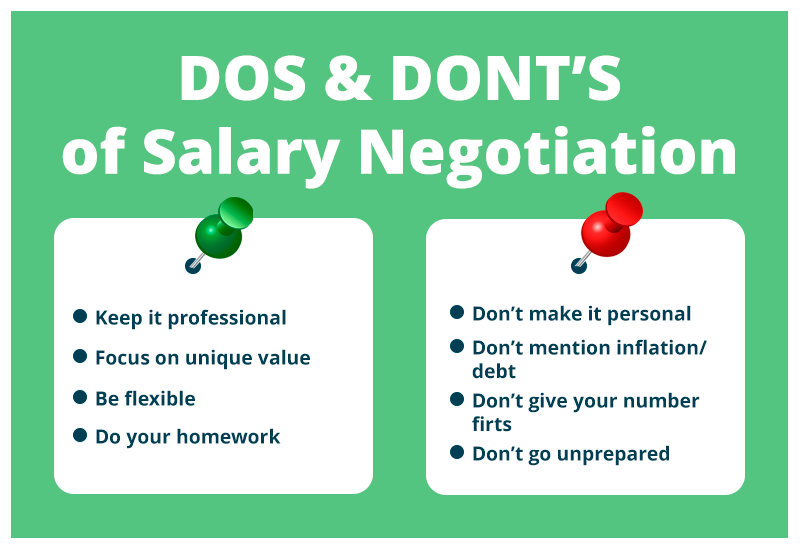Negotiating a raise can be a daunting task, but it’s essential to ensure you’re being paid what you’re worth. If you’re a hard-working employee who has been with a company for a while, it’s only natural to expect to be compensated fairly for your efforts. While it may seem easier to avoid the conversation altogether, taking the initiative to negotiate a raise can lead to greater job satisfaction, higher earnings, and better opportunities in the future.
In this article, we will discuss strategies for negotiating a raise, including how to research industry standards, time your request, make your case, respond to objections, and find a win-win outcome. Whether you’re seeking a raise in your current job or preparing for a future negotiation, these tips will help you get paid what you’re worth.
Do Your Research
When negotiating a raise, it’s important to do your research by gathering information about industry standards for your position and location, as well as your company’s financial health and recent successes. You should also reflect on your own value and contributions to the company by making a list of your accomplishments and how they have contributed to the company’s success. This will help you determine the typical salary range for your position and give you insight into what your company may be willing to offer in terms of compensation. By doing your research, you’ll be better equipped to negotiate a raise that is in line with industry standards and reflective of your contributions to the company.
Timing Is Everything
Timing is crucial when asking for a raise. Choosing the right time involves taking into account company policies and budget cycles, as well as anticipating potential objections and preparing counterarguments. Consider asking for a raise after you’ve completed a major project or achieved a significant milestone.
Before approaching your boss, it’s important to research company policies to determine if there are specific times of the year when raises are typically given. You should also take into consideration the company’s financial standing and whether they are currently experiencing any financial constraints.
Anticipating objections, such as budget limitations, can help you prepare strong counterarguments that address these concerns. For instance, if your boss says that there’s no room in the budget for a raise, you could propose a performance-based bonus instead. By carefully considering the timing and potential objections, you can increase your chances of a successful negotiation.
Making Your Case
When negotiating a raise, it’s important to make a strong case for yourself. This involves articulating your achievements and impact on the company, framing your request in terms of the company’s goals and priorities, and providing evidence of your value and contributions.
Start by outlining your achievements and the ways in which you have contributed to the company’s success. Be specific and provide examples to illustrate your point. You should also tie your achievements to the company’s goals and priorities. This shows that you understand the bigger picture and are invested in the company’s success.
Next, provide evidence of your value and contributions. This may include performance metrics, customer feedback, or testimonials from colleagues or clients. By providing concrete evidence of your contributions, you demonstrate your value to the company and make a strong case for a raise.
Finally, be confident and assertive in your request. Know your worth and be prepared to make your case. By framing your request in terms of the company’s goals and priorities and providing evidence of your value, you increase your chances of a successful negotiation.

Responding to Objections
In any negotiation, it’s important to anticipate potential objections and be prepared to respond with counterarguments and evidence. When it comes to negotiating a raise, your boss may have objections such as budget constraints or concerns about your performance.
To respond to objections, start by listening to your boss’s concerns and addressing them directly. Use evidence to support your position and show how your achievements have contributed to the company’s success. If your boss brings up concerns about your performance, be prepared to provide examples of how you have addressed those concerns and improved your performance.
It’s also important to know when to push and when to compromise. If your boss is hesitant to grant your request, consider alternative options such as a performance-based bonus or additional vacation time. However, if you feel that your request is reasonable and in line with industry standards, don’t be afraid to push for what you deserve.
Responding to objections is about finding common ground and working towards a mutually beneficial solution.
What to Do If You Don’t Get the Raise
If you don’t get the raise you were hoping for, there are several options to consider:
- Know when to accept a compromise and when to keep pushing: If your boss is willing to negotiate on other forms of compensation or benefits, such as additional vacation time or a performance-based bonus, consider whether these alternatives are acceptable to you. However, if you feel that the compromise is not enough, you may need to keep pushing for a better outcome.
- Find alternative forms of compensation or benefits: If a raise is not possible, there may be other forms of compensation or benefits that are available. This could include a flexible work schedule, telecommuting options, or additional professional development opportunities.
- Consider the possibility of finding a new job: If you feel that your compensation does not reflect your value and contributions to the company, it may be time to start exploring other job opportunities. Before making a decision, make sure to research your options and consider the potential impact on your career goals and work-life balance.
Regardless of the outcome, it’s important to maintain a positive and professional attitude throughout the negotiation process. Keep the lines of communication open with your boss, and continue to focus on your performance and contributions to the company. By doing so, you’ll be well-positioned for future opportunities and negotiations.
Conclusion
In conclusion, negotiating a raise can be a daunting task, but with the right preparation and approach, it can also be a rewarding and empowering experience. Remember, negotiating a raise is not just about getting more money. It’s also about advocating for your value and contributions to the company, advancing your career, and achieving your goals. So, don’t be afraid to take action and negotiate for what you deserve.
In closing, it’s important to maintain a positive and professional attitude throughout the negotiation process. Keep an open mind, be flexible, and focus on your goals and priorities. By doing so, you’ll be well-positioned for success and ready to take on new challenges and opportunities.







